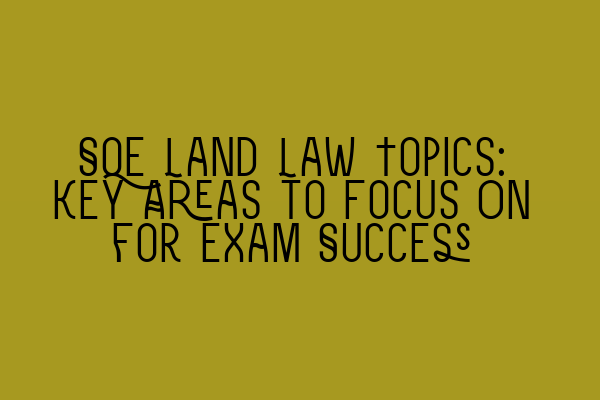SQE Land Law Topics: Key Areas to Focus On for Exam Success
Preparing for the SQE (Solicitors Qualifying Exam) in Land Law can be a daunting task. With a vast amount of material to cover, it’s essential to identify the key areas to focus on to ensure exam success. In this article, we will explore the main topics you need to master and provide some tips for effective preparation.
1. Freehold and Leasehold Estates
Understanding the difference between freehold and leasehold estates is fundamental in Land Law. Freehold estates provide ownership of property without any time restrictions, whereas leasehold estates grant a temporary right to occupy a property. It’s crucial to comprehend the characteristics, rights, and responsibilities associated with each type of estate.
For an in-depth understanding of contractual capacity, you can read our related article Understanding Contractual Capacity: Rights and Limitations.
2. Co-ownership
Co-ownership occurs when two or more individuals hold an interest in a property jointly. It’s essential to be familiar with the different forms of co-ownership, such as joint tenancy and tenancy in common, and the rights and obligations that arise from each. Additionally, understanding the principles of severance and survivorship is crucial when dealing with co-ownership scenarios.
For interactive mock tests to test your knowledge in Contract Law, check out our related article Interactive SQE Mock Tests for Contract Law: Test Your Knowledge.
3. Registered and Unregistered Land
Land in the UK can be registered or unregistered. Registered land is governed by the Land Registration Act 2002 and provides a more secure system of land ownership. Unregistered land follows the principles of common law and requires manual investigation of land rights. Understanding the differences between the two systems and the implications for property transactions is essential in Land Law.
To gain expert insights and guidance in Contract Law, you can join our SQE Contract Law webinars. Check out our related article Join Our SQE Contract Law Webinars: Expert Insights and Guidance.
4. Easements and Covenants
Easements and covenants play a significant role in land transactions. An easement is a right over another person’s land, such as a right of way or right to light. Covenants are voluntary obligations that run with the land, such as restrictive covenants that limit the use of the property. Understanding the elements, creation, and enforceability of easements and covenants is crucial for success in the SQE Land Law exam.
5. Mortgages
Mortgages are a common method of financing property purchases. It’s vital to understand the nature of a mortgage, the rights and duties of the mortgagor and mortgagee, and the process of foreclosure or repossession in case of default. Additionally, knowledge of the recent changes and reforms in mortgage law can demonstrate your up-to-date understanding of the subject matter.
To analyze recent changes in Contract Law, read our related article Contract Law Reforms: An Analysis of Recent Changes.
6. Landlord and Tenant Law
Landlord and tenant law governs the rights and obligations of landlords and tenants in property leases. Topics to focus on include lease creation, terms of the lease, rent and repairs, termination of leases, and issues related to security of tenure. Familiarizing yourself with the relevant statutory provisions and case law will help you navigate through complex landlord and tenant scenarios in the exam.
To understand the rights and responsibilities of parties involved in a contract, refer to our related article Parties in a Contract: Rights and Responsibilities.
Final Thoughts
Mastering these key areas in Land Law is crucial for your success in the SQE exam. Remember to stay organized and prioritize your studying. Focus on understanding the underlying principles, statutory provisions, and relevant case law. Regular practice through mock tests and seeking expert guidance can also significantly enhance your chances of achieving exam success.
Good luck with your SQE Land Law preparation!
